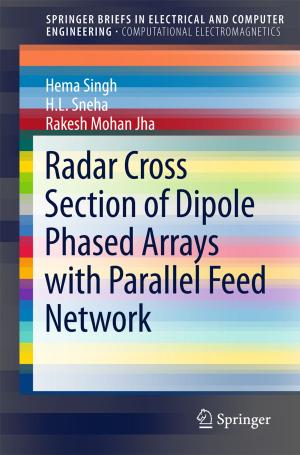Information Theory for Electrical Engineers
Nonfiction, Computers, Advanced Computing, Theory, Science & Nature, Technology, Telecommunications| Author: | Orhan Gazi | ISBN: | 9789811084324 |
| Publisher: | Springer Singapore | Publication: | March 9, 2018 |
| Imprint: | Springer | Language: | English |
| Author: | Orhan Gazi |
| ISBN: | 9789811084324 |
| Publisher: | Springer Singapore |
| Publication: | March 9, 2018 |
| Imprint: | Springer |
| Language: | English |
This book explains the fundamental concepts of information theory, so as to help students better understand modern communication technologies. It was especially written for electrical and communication engineers working on communication subjects. The book especially focuses on the understandability of the topics, and accordingly uses simple and detailed mathematics, together with a wealth of solved examples.
The book consists of four chapters, the first of which explains the entropy and mutual information concept for discrete random variables. Chapter 2 introduces the concepts of entropy and mutual information for continuous random variables, along with the channel capacity. In turn, Chapter 3 is devoted to the typical sequences and data compression. One of Shannon’s most important discoveries is the channel coding theorem, and it is critical for electrical and communication engineers to fully comprehend the theorem. As such, Chapter 4 solely focuses on it.
To gain the most from the book, readers should have a fundamental grasp of probability and random variables; otherwise, they will find it nearly impossible to understand the topics discussed.
This book explains the fundamental concepts of information theory, so as to help students better understand modern communication technologies. It was especially written for electrical and communication engineers working on communication subjects. The book especially focuses on the understandability of the topics, and accordingly uses simple and detailed mathematics, together with a wealth of solved examples.
The book consists of four chapters, the first of which explains the entropy and mutual information concept for discrete random variables. Chapter 2 introduces the concepts of entropy and mutual information for continuous random variables, along with the channel capacity. In turn, Chapter 3 is devoted to the typical sequences and data compression. One of Shannon’s most important discoveries is the channel coding theorem, and it is critical for electrical and communication engineers to fully comprehend the theorem. As such, Chapter 4 solely focuses on it.
To gain the most from the book, readers should have a fundamental grasp of probability and random variables; otherwise, they will find it nearly impossible to understand the topics discussed.















